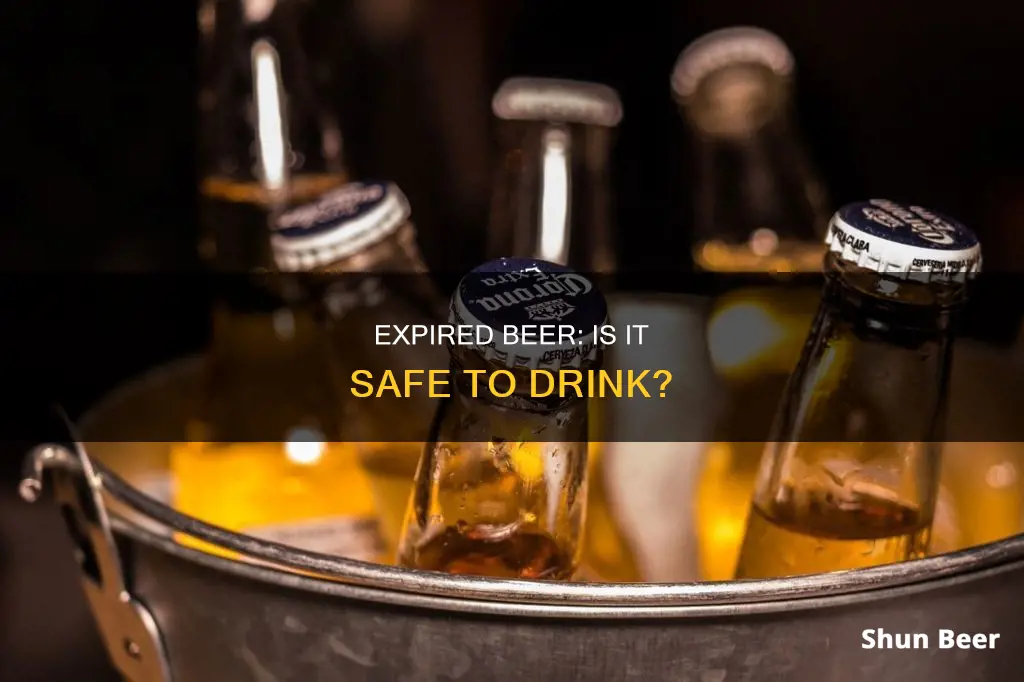
Beer is just like any other food or drink and has a shelf life. It is generally safe to drink beer after its expiration date, but it may have an unpleasant taste and cause an upset stomach. The higher the ABV, the longer the beer will last. Properly sealed beer stored in a cold, dark place can last for up to 24 months after its expiration date. However, it is not recommended to drink beer that is extremely old, as it may have undergone significant changes in taste and composition, which can lead to temporary health issues such as vomiting, nausea, and stomach problems.
| Characteristics | Values |
|---|---|
| Will drinking expired beer hurt you? | In most cases, drinking expired beer will not make you sick, but it may cause a headache, stomach ache, nausea, or vomiting. |
| How does expired beer taste? | Expired beer is known to be less carbonated, with off-flavours such as toffee, caramel, grainy, or cardboard-like flavours. |
| How long does beer last after the expiration date? | Beer will last anywhere from 6 to 9 months after the expiry date. If refrigerated, it can last up to 24 months. |
| Factors affecting beer expiration | Exposure to light, oxygen, and bacteria can cause beer to expire faster. Proper storage in a cold, dark place can extend its shelf life. |
What You'll Learn

Drinking expired beer can cause nausea and stomach aches
Drinking expired beer is unlikely to be harmful to your health. However, it can cause some unpleasant side effects, such as nausea and stomach aches. This is because expired beer has undergone chemical changes, which affect its taste and composition.
Beer, like any other food or drink, has a shelf life. It is made from organic, plant-based ingredients, which will eventually decay. This natural decay is inevitable, despite brewers' best efforts to prevent it. The higher the alcohol content, the longer it will take for the beer to expire. Low alcohol beers will go bad in around six months, whereas high ABV beers (those with 8% alcohol or more) can age well and may even improve in flavour over a few years.
However, even these strong beers will eventually go stale, and their flavour will deteriorate. The same is true of pasteurised and unpasteurised beer. Pasteurised beer is treated with heat to kill bacteria and prevent yeast from growing, but it will still go off eventually. Unpasteurised beer is even more vulnerable to the effects of time and should be consumed as close to the expiration date as possible.
Expired beer is known to be less carbonated, and the flavours are often described as "off". It may taste flat, sour, or similar to cardboard or vinegar. It may also have a "skunky" smell and taste, caused by exposure to light, particularly ultraviolet rays.
While drinking expired beer is not dangerous, it is not recommended due to the unpleasant taste and possible side effects, such as nausea and stomach aches.
Truck Drivers and Beer: Drinking in the Sleeper Berth?
You may want to see also

It can also lead to vomiting
Drinking expired beer can lead to vomiting for several reasons. Beer is made from organic plant ingredients that will eventually decay, and the longer beer is past its expiration date, the more off-flavors will develop. Expired beer is also known to be less carbonated, and the flavors are off. If the beer has been exposed to oxygen, its taste can become sour or even similar to cardboard. In some cases, malty beers can develop toffee, caramel, or grainy tones.
Additionally, exposure to light, specifically ultraviolet (UV) rays, can cause the hop-derived compounds in beer to break down and combine with a sulfuric compound, releasing an odor similar to that of a skunk. This process can also cause the beer to taste like soggy cardboard.
Finally, while bacterial infections in beer are rare, if bacteria finds a way to get into the beer, it will start eating away at it. This can lead to an increased likelihood of vomiting for the consumer.
Beer Blues: Bad Brews Make You Sick?
You may want to see also

Expired beer loses its carbonation
Beer is just like any other drink and has a shelf life. It is made from organic, plant-based ingredients that will eventually decay. Beer is generally safe to drink after its expiration date, but it will lose its carbonation and the flavours will be off. The higher the ABV, the longer it will last, and the more positive the results will be. For example, stouts and barley wines tend to improve with age.
The flavour of hoppy beers, such as IPAs, will deteriorate soon after their expiration date. Stronger, less hoppy beers will last longer. If you open a beer and leave it in the fridge for a couple of hours, its taste will change. It is best to drink it all and not store it for later.
The longer the beer is past its expiration date, the more the flavour will be affected. If the beer is refrigerated, it can last up to 24 months after its printed expiry date. However, the quality will be lower, and there may be some unwanted flavours. Generally, it is okay to drink beer a few months after its expiration date, but its taste and quality will have changed.
Expired beer is less carbonated, and its flavours will be off. If the beer has only recently expired, you may not notice much difference, if any. However, the differences will become more apparent after six months or more. Therefore, it is still okay to drink beer that has only recently expired. The more months that have passed, the more problematic the issue becomes.
The Art of Distilling: Brewing Beer, Simplified
You may want to see also

The flavour of the beer fades and off-flavours develop
The flavour of beer does not remain the same forever. It fades and off-flavours develop over time. This is due to the oxidation process, which is caused by oxygen exposure. The oxygen in the air interacts with the molecules in the beer and its ingredients, changing its chemical composition and, consequently, its flavour.
Hoppy beers, such as IPAs, will start to lose their flavour soon after their expiration date. On the other hand, stronger beers with less prominent hoppy flavours will last longer. Beers with higher alcohol content, such as stouts and barley wines, can even improve with age. However, this depends on how they are stored.
Oxidation in dark beers can turn malt flavours into those of rotting fruit or sherry. In light-coloured beers, oxidation will remove all the hoppy, malty flavours, leaving the beer tasting like wet paper. In rare cases, oxidation can improve the flavour of certain beers. For example, when barrelling Lambics, subjecting the beer to oxidation under controlled temperatures can improve the flavour and elevate the drinking experience.
Beer is also susceptible to skunking, which is caused by exposure to ultraviolet (UV) rays. UV rays can cause the hop-derived compounds in beer to break down and combine with sulphuric compounds, creating a skunky odour and taste. Even a few seconds of light exposure is enough to skunk a beer. Green bottles offer some protection against UV rays, while brown bottles offer the most protection.
Beer and Injections: What's Safe to Drink?
You may want to see also

Beer is best stored in a cold, dark place
UV light can also be very problematic for any type of beer. It promotes a "skunky" taste and smell, which you want to avoid. Keeping beer away from light exposure is crucial if you want it to retain its best taste. Brown bottles offer the most protection for your beer, followed by green bottles, which are fairly effective in blotting out UV rays. Clear bottles offer the least resistance to direct sunlight.
Storing beer in a refrigerator, away from direct sunlight, is extremely critical in preventing ageing and retaining the beer's freshness for longer. Storing cans and bottles upright, instead of on their sides, is also effective in minimising oxidation.
Drinking Beer in Public: Vietnam's Laws and Culture
You may want to see also
Frequently asked questions
Drinking expired beer will not cause serious harm but it is not recommended. It may cause an upset stomach, nausea, vomiting, and stomach problems.
Beer will last anywhere from 6 to 9 months after its expiry date. If refrigerated, it can last up to 24 months.
Check for a lack of carbonation when opening, a change in taste or smell, or something strange floating in the beer.
Store beer in a cold, dark place. Keep it standing upright to minimise the surface area exposed to oxidation.







